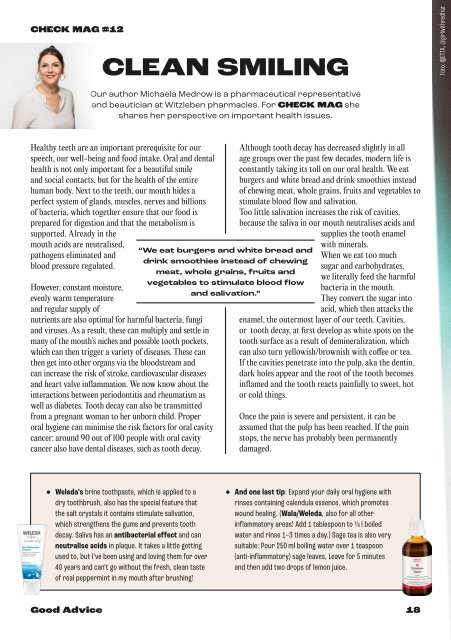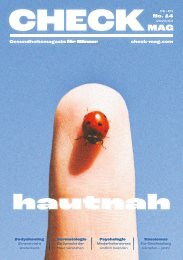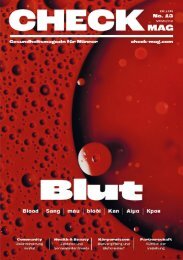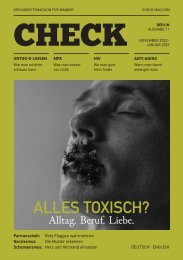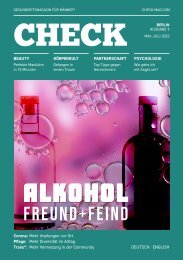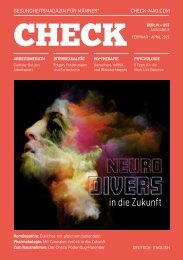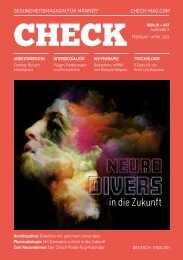CHECK Magazin - Gesundheitsmagazin für Männer No.12
Wenn wir, nicht erst seit gestern, von Ressourcen sparen reden, fällt oft die am nächsten liegende Ressource unter den Tisch: der Mensch. Auch wir sind nicht unerschöpflich belastbar, auch wir haben Grenzen. Mit dieser Ausgabe wollen wir uns daher ein bisschen befreien: Von Keimen, negativen Gedanken, dem Gefühl, nicht gehört zu werden, unnötigem Körperfett, Nahrung, die uns gestresster und ängstlicher macht, Krankheitsrisiken oder auch Scham.
Wenn wir, nicht erst seit gestern, von Ressourcen sparen reden, fällt oft die am nächsten liegende Ressource unter den Tisch: der Mensch. Auch wir sind nicht unerschöpflich belastbar, auch wir haben Grenzen. Mit dieser Ausgabe wollen wir uns daher ein bisschen befreien: Von Keimen, negativen Gedanken, dem Gefühl, nicht gehört zu werden, unnötigem Körperfett, Nahrung, die uns gestresster und ängstlicher macht, Krankheitsrisiken oder auch Scham.
Erfolgreiche ePaper selbst erstellen
Machen Sie aus Ihren PDF Publikationen ein blätterbares Flipbook mit unserer einzigartigen Google optimierten e-Paper Software.
<strong>CHECK</strong> MAG #12<br />
CLEAN SMILING<br />
Our author Michaela Medrow is a pharmaceutical representative<br />
and beautician at Witzleben pharmacies. For <strong>CHECK</strong> MAG she<br />
shares her perspective on important health issues.<br />
Foto: ©ETTA, @girlwithredhat<br />
Healthy teeth are an important prerequisite for our<br />
speech, our well-being and food intake. Oral and dental<br />
health is not only important for a beautiful smile<br />
and social contacts, but for the health of the entire<br />
human body. Next to the teeth, our mouth hides a<br />
perfect system of glands, muscles, nerves and billions<br />
of bacteria, which together ensure that our food is<br />
prepared for digestion and that the metabolism is<br />
supported. Already in the<br />
mouth acids are neutralised,<br />
pathogens eliminated and<br />
blood pressure regulated.<br />
However, constant moisture,<br />
evenly warm temperature<br />
and regular supply of<br />
nutrients are also optimal for harmful bacteria, fungi<br />
and viruses. As a result, these can multiply and settle in<br />
many of the mouth’s niches and possible tooth pockets,<br />
which can then trigger a variety of diseases. These can<br />
then get into other organs via the bloodstream and<br />
can increase the risk of stroke, cardiovascular diseases<br />
and heart valve inflammation. We now know about the<br />
interactions between periodontitis and rheumatism as<br />
well as diabetes. Tooth decay can also be transmitted<br />
from a pregnant woman to her unborn child. Proper<br />
oral hygiene can minimise the risk factors for oral cavity<br />
cancer: around 90 out of 100 people with oral cavity<br />
cancer also have dental diseases, such as tooth decay.<br />
“We eat burgers and white bread and<br />
drink smoothies instead of chewing<br />
meat, whole grains, fruits and<br />
vegetables to stimulate blood flow<br />
and salivation.”<br />
Although tooth decay has decreased slightly in all<br />
age groups over the past few decades, modern life is<br />
constantly taking its toll on our oral health. We eat<br />
burgers and white bread and drink smoothies instead<br />
of chewing meat, whole grains, fruits and vegetables to<br />
stimulate blood flow and salivation.<br />
Too little salivation increases the risk of cavities,<br />
because the saliva in our mouth neutralises acids and<br />
supplies the tooth enamel<br />
with minerals.<br />
When we eat too much<br />
sugar and carbohydrates,<br />
we literally feed the harmful<br />
bacteria in the mouth.<br />
They convert the sugar into<br />
acid, which then attacks the<br />
enamel, the outermost layer of our teeth. Cavities,<br />
or tooth decay, at first develop as white spots on the<br />
tooth surface as a result of demineralization, which<br />
can also turn yellowish/brownish with coffee or tea.<br />
If the cavities penetrate into the pulp, aka the dentin,<br />
dark holes appear and the root of the tooth becomes<br />
inflamed and the tooth reacts painfully to sweet, hot<br />
or cold things.<br />
Once the pain is severe and persistent, it can be<br />
assumed that the pulp has been reached. If the pain<br />
stops, the nerve has probably been permanently<br />
damaged.<br />
· Weleda’s brine toothpaste, which is applied to a<br />
dry toothbrush, also has the special feature that<br />
the salt crystals it contains stimulate salivation,<br />
which strengthens the gums and prevents tooth<br />
decay. Saliva has an antibacterial effect and can<br />
neutralise acids in plaque. It takes a little getting<br />
used to, but I’ve been using and loving them for over<br />
40 years and can’t go without the fresh, clean taste<br />
of real peppermint in my mouth after brushing!<br />
· And one last tip: Expand your daily oral hygiene with<br />
rinses containing calendula essence, which promotes<br />
wound healing. (Wala/Weleda, also for all other<br />
inflammatory areas! Add 1 tablespoon to 1/8 l boiled<br />
water and rinse 1–3 times a day.) Sage tea is also very<br />
suitable: Pour 250 ml boiling water over 1 teaspoon<br />
(anti-inflammatory) sage leaves, Leave for 5 minutes<br />
and then add two drops of lemon juice.<br />
Good Advice18


